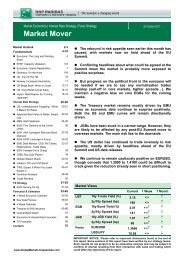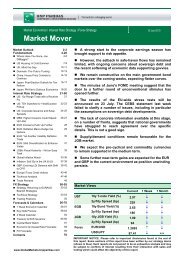Market Economics | Interest Rate Strategy - BNP PARIBAS ...
Market Economics | Interest Rate Strategy - BNP PARIBAS ...
Market Economics | Interest Rate Strategy - BNP PARIBAS ...
Create successful ePaper yourself
Turn your PDF publications into a flip-book with our unique Google optimized e-Paper software.
significantly reduced productivity. What is more,<br />
Japanese consumers must pay the price through the<br />
tax money spent subsidising farmers and in the<br />
higher retail price of rice compared to other countries.<br />
Meanwhile, part-time farming households tend to<br />
have higher incomes than full-time farming<br />
households and households of salaried workers. This<br />
is a result of the protectionist policies.<br />
Misguided agricultural policies have deprived<br />
Japan’s regions of growth opportunities<br />
In passing, it is widely felt that protection of Japan’s<br />
unproductive farming sector could prevent the<br />
country from joining the TPP to the detriment of<br />
export opportunities for Japan’s manufactured goods.<br />
It would certainly be unfortunate if agriculture – a<br />
mere 1% of GDP – were to deprive Japan’s exporters<br />
of growth opportunities, but the problem does not<br />
end there.<br />
In the US and other developed nations, agriculture is<br />
not only an export sector in its own right, boasting<br />
high productivity, but is also an industry capable of<br />
attracting young workers thanks to its relatively high<br />
income level. Japan’s misguided agricultural policies,<br />
on the other hand, have deprived regional economies<br />
of growth opportunities and prevented income<br />
disparities with urban areas from being corrected.<br />
Maintaining protective regulations will not<br />
advance overall economic welfare<br />
Consumers suffer the most from regulations<br />
preserving and protecting vested interests.<br />
Maintaining such regulations will not advance the<br />
public’s economic welfare. Producers capable of<br />
supplying the goods/services that people want are<br />
not entities run or supported by the government, but<br />
private-sector agents capable of creating innovative<br />
products/services in a competitive environment.<br />
If the Kan government truly wants to put people’s<br />
lives first, deregulation is necessary<br />
The same thing can be said for social security<br />
services. Regulation – rather than a lack of fiscal<br />
resources – is the main reason why the<br />
nursing/healthcare services sought by the public are<br />
not being supplied. Thus, while deregulation might<br />
seem on the surface to be a policy benefiting<br />
business, it will also allow consumers to find<br />
companies that efficiently supply desired<br />
goods/services at low prices.<br />
If the Kan government truly wants to put people’s<br />
lives first, deregulation is the necessary means.<br />
“Opening Japan,” therefore, should lead to greater<br />
affluence.<br />
Ryutaro Kono 13 January 2011<br />
<strong>Market</strong> Mover<br />
18<br />
www.Global<strong>Market</strong>s.bnpparibas.com

















